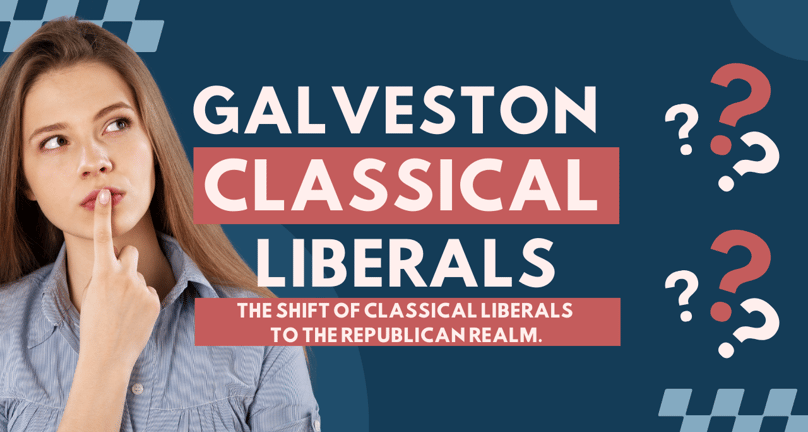Galveston Classical Liberals
The Shift of Classical Liberals to the Republican Realm.


Introduction
In today's rapidly changing political environment, a significant shift has been observed among classical liberals. Historically advocates of economic liberalism, individual freedoms, and equal protection under the law, many classical liberals find themselves leaning more towards the Republican Party, as they perceive it to be moving leftward, while the Democratic Party, in their view, gravitates towards the far-left spectrum.
Classical Liberalism: Core Values and Principles
Classical liberalism emphasizes the importance of individual liberties, limited government, rule of law, and free-market capitalism. It advocates for the protection of individual rights against government intrusion, fostering a society where individuals are free to pursue their own happiness and well-being.
Perceived Shift in the Republican Party
Some classical liberals argue that the Republican Party has undergone a transformation, increasingly embracing policies and stances that align with their values. This perceived shift includes a greater focus on individual freedoms, economic pragmatism, and a balanced approach to governance. The adoption of more centrist and inclusive policies by some Republican candidates has attracted classical liberals seeking a middle ground in the political landscape.
Democratic Party: A Move to the Far Left?
Concurrently, there is a perception among some classical liberals that the Democratic Party has shifted to the extreme left. They point to proposals such as Medicare for All, the Green New Deal, and calls for defunding the police as indicative of a departure from centrist and pragmatic governance. The emphasis on identity politics, progressive social policies, and increased government intervention has raised concerns among classical liberals about the trajectory of the party.
The Appeal of a Balanced Approach
For classical liberals, the allure of the Republican Party lies in what they see as a balanced approach to political governance. The perceived shift towards more moderate policies, coupled with a commitment to individual liberties and economic freedom, resonates with their foundational principles. The prospect of pragmatic solutions to societal challenges, rather than ideological extremes, appeals to their desire for rational and reasoned discourse.
Conclusion
The political tides are ever-changing, and the perceived shift of classical liberals towards the Republican Party is emblematic of the evolving dynamics within the American political landscape. As parties evolve and adapt, classical liberals find themselves navigating new waters, seeking a political home that aligns with their foundational principles and values. The quest for balance, individual freedoms, and pragmatic governance continues to shape the political journey of classical liberals in an increasingly polarized environment.
